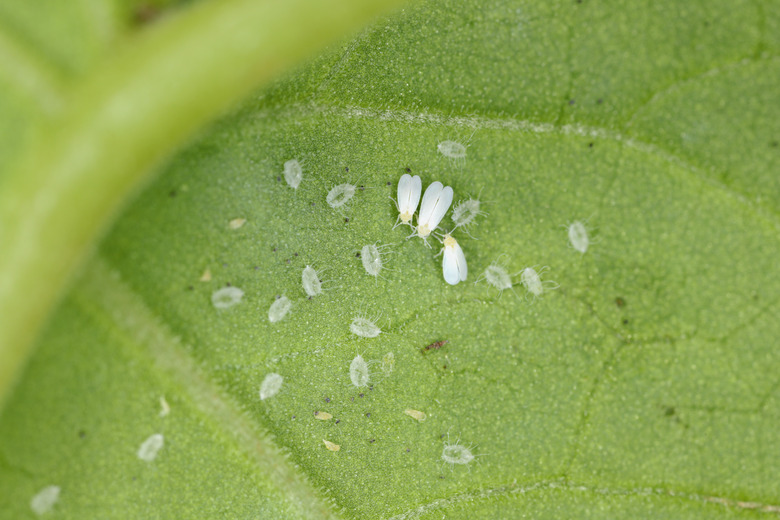Home Remedies To Kill Whiteflies On Plants
We may receive a commission on purchases made from links.
There's no way around it — whiteflies can be hard to eliminate. That doesn't mean that you have to blast them with the most toxic sprays you can buy. There are plenty of home remedies for killing whiteflies on plants, which is particularly helpful since the insect has become resistant to certain chemicals.
Whiteflies and Where They're Found
Whiteflies and Where They're Found
The whitefly is not a white version of any sort of fly. In fact, it isn't a fly at all. Closely related to mealybugs, aphids, and scale insects, the whitefly is a small insect about 1/10 to 1/16 of an inch in length with mothlike white wings and a soft body.
Whiteflies gather on the underside of leaves during the day when it's warm, and they're easily sent flying off in swarms when disturbed. Some species are particularly troublesome because they target a wide variety of plants. Hibiscus, poinsettia, petunia, pepper, eggplant, sweet potato, cabbage, tomato, squash, cucumber, and citrus are just a few of the more than 250 vegetable and ornamental plants that can host these pesky little visitors.
Unable to survive winter outdoors in colder zones, whiteflies in these areas are more likely to be found indoors on houseplants or in greenhouses. In the warmer Southern and coastal states, however, whiteflies survive the winter season and can be found year-round in outdoor gardens.
Confirming Their Presence
Confirming Their Presence
Plants infested by whiteflies become damaged because the insects suck out plant juices. The plant is weakened, its growth is stunted, and the leaves begin to wilt and turn yellow and eventually fall off. The whitefly excretes undigestible sap onto the leaves as a sticky substance called honeydew. Look for a sooty black mold promoted by the presence of the honeydew.
Because whiteflies are attracted to new leaves, you should pay attention to any new growth, feeling for the telltale stickiness. Check for pale yellow eggs laid in a circular pattern and for white oval-shaped larvae.
Using Home Remedies for Whiteflies
Using Home Remedies for Whiteflies
If you have a whitefly problem, avoid using insecticides. First, it's important to protect pollinators that visit the same garden. Second, lacewings, lady beetles, and spiders are natural whitefly predators. If you rid your garden of them, you won't be able to take advantage of the assistance they provide in killing the whiteflies.
There are several home remedy suggestions for controlling, preventing, and killing whiteflies:
- Inspect new plants and isolate them for several days before placing
them among your other plants.
- Spray affected plants with water from your garden hose or from a
spray bottle. It will scatter the whiteflies and get rid of any eggs or nymphs.
- Use a small, handheld vacuum to get rid of adults and nymphs.
Vacuum early in the morning when it's cooler outside and the whiteflies are moving
more slowly. Place the vacuum bag inside another secure plastic bag in your
freezer for 24 hours to kill the whiteflies. Don't empty your vacuum in the
house.
- Do your early season mulching with aluminum reflective mulch,
which makes it difficult for whiteflies to find the plants they would normally
target.
- Shoot a squirt of dish soap into a gallon of water and spray
your plants with this homemade pesticide mixture in the evening when it's cooler outside. Spray
them three times about once a week when temperatures are below 90 degrees
Fahrenheit and be sure to water the plants the day before you spray.
- Whiteflies are attracted to anything yellow, so make your
own yellow sticky traps by covering yellow index cards with petroleum jelly or
by coating boards painted yellow with a 50-50 mixture of petroleum jelly and
dish soap. Attach them to stakes around your garden.
- Create a garden environment that attracts hummingbirds, which are
another natural whitefly predator.
